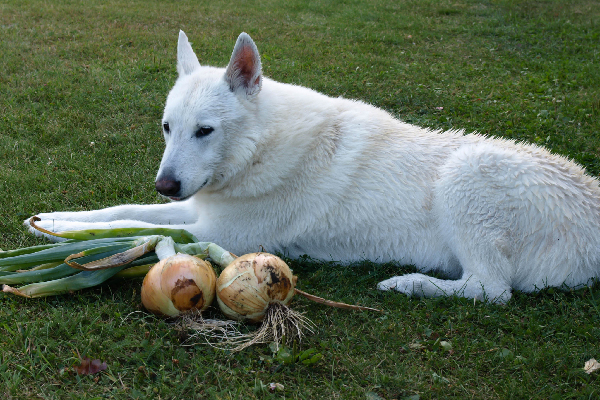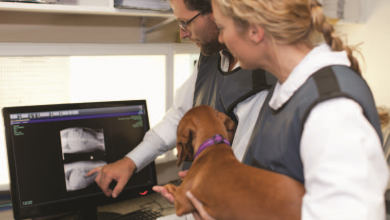So, Your Dog Ate Onions — Here’s What to Know and What to Do Next

[ad_1]
Onions are unique members of the root vegetable family because they (like garlic) are bulbs and do not grow as deeply as other root vegetables. Onions come in white, yellow and red bulbs, as well as chives and leeks, and are a common flavorful addition to meals and side dishes, served both cooked and raw. They help bring flavor to many of our favorite dishes, but can dogs eat onions? If your dog ate onions, what do you do?
First, what to know about dogs and onions
Grapes, chocolates, onions and other some other humans foods are toxic to dogs. Photography ©humonia | iStock / Getty Images Plus.
We spoke with Emmy-award winning veterinarian Dr. Jeff Werber to learn more about how dangerous onions are for our dogs. Dr. Jeff explains, “Traditionally, we have always recommended avoiding raw onions and raw garlic because of a type of toxin that can have a negative effect on red blood cells.” The toxic ingredient is called n-propyl disulfide, which is an oxidant that can do oxidant damage to red blood cells.
So, can dogs eat onions?
Well, you shouldn’t give your dog a bowl of onions to snack on. Onions aren’t healthy for dogs, but unlike grapes, where even a small amount can be toxic, onion toxicity depends on how much of an onion a dog consumes. Embrace Pet Insurance Claims Manager Rachel Hinder RVT explains that “Typically, if a dog ingests only a small amount of onion, it should not cause any problems.” However, she did caution that “the size of the dog also matters, small pieces of onions are a lot bigger problem for tiny 3-pound Yorkies than 200-pound Great Danes.”
One of the dangers of onions and dogs is that the toxins can build up in their system, meaning that they could slowly be reaching a point where an onion exposure could get them sick, or that there might be what Dr. Werber calls a cumulative effect. “To be safe, avoid onions and garlic,” Dr. Werber suggests. Consuming onions can lead to dogs developing a condition called hemolytic anemia. This condition impacts/destroys a dog’s red blood cells, leaving dogs without enough of them for healthy functioning. Severe onion poisoning in dogs can be fatal.
What about cooked onions?
Although onions might not be as toxic to our dogs as grapes or xylitol, avoid giving onions to your dog regardless of if they are raw or cooked. Cooking onions doesn’t have an impact on the safety of onions and cooked onions are still poisonous to dogs because of their toxic effect on a dog’s red blood cells. All forms of onion can be toxic to dogs — whether powdered, dried, fresh or cooked.
What about broth cooked with onions?
If you are cooking for your dog or treating your dog to some snacks from your plate, avoid sharing any food with your dog that has been cooked with onions including if you use onions in your broth. Hinder advises that “although, a small amount of onion is unlikely to cause problems, it is safer to avoid all together.”
Similarly, if you are purchasing a pre-made broth, read the labels on the broth and select a broth that doesn’t include onions. Hinder encourages dog guardiansl to also look for onion powder as an ingredient in pre-made foods and avoid using in any recipes you will be sharing with your dog because it is made up of dried and ground onions and can be harmful to your dog.
No matter if you are using the onion’s juice, flesh or even leaves, all parts of the onions will cause issues with dogs. Do not cook something with onions for your dog or even onion powder.
What should you do if your dog ate onions?
To be safe, keep all onions and all products containing onions away from your dogs. But what happens if you’re cooking and you drop a slice of onion on the floor or a friend shares a bite of their lunch with your dog and it includes onion? While we don’t want our dogs eating onions, having a bite of something with onion isn’t likely to make your dog sick. “Your dog probably would not eat enough to cause a real problem because dogs typically don’t like the taste,” Dr. Werber says.
If you think your dog ate onions in large quantities, or if your dog seems like he isn’t feeling well, Dr. Werber suggests seeking immediate veterinary care. Your veterinarian will be able to evaluate your dog and determine if any treatment is necessary.
Symptoms of onion toxicity are symptoms of anemia — when your dog has low red blood cells. Look for decreased appetite, weakness, lethargy and pale gums. The ASPCA’s animal poison control site (aspca.org/animal-poison-control) also says that clinical signs include vomiting, panting and high heart rate. If you see any of these symptoms, take your dog immediately to the veterinarian.
Thumbnail: Photography © vvuls | iStock / Getty Images Plus.
This piece was originally published on May 4, 2018.
Sassafras Lowrey is an award-winning author. Her novels have been honored by organizations ranging from the Lambda Literary Foundation to the American Library Association. Sassafras is a Certified Trick Dog Instructor, and assists with dog agility classes. Sassafras lives and writes in Brooklyn with her partner, a senior Chihuahua mix, a rescued Shepherd mix and a Newfoundland puppy, along with two bossy cats and a semi-feral kitten. Learn more at sassafraslowrey.com.
Plus, are onions good for YOU? Learn about the health benefits of onions >>
Read more about what human foods dogs can and can’t eat on Dogster.com:
[ad_2]
Source link






